Red Bull has become a staple in many people’s lives, providing a much-needed energy boost when fatigue sets in. But have you ever wondered what exactly is in your can of Red Bull? Understanding the nutritional information of this popular energy drink can help you make informed choices about your consumption. Let’s take a closer look at the ingredients, caffeine content, sugar content, and health effects of Red Bull.
- Red Bull contains caffeine, B-group vitamins, sugars, taurine, and water.
- Each 8.4 fl oz can of Red Bull contains 80 mg of caffeine, similar to coffee and cola.
- B-group vitamins, including niacin, pantothenic acid, vitamin B6, and vitamin B12, are present in Red Bull.
- Red Bull contains 27 g of sugars per can, comparable to the sugar content of apple juice.
- Taurine, an amino acid, is found in Red Bull and other foods like scallops, fish, and poultry.
- Water is a main ingredient in Red Bull, sourced with high standards of quality.
Exploring Red Bull’s Ingredients: A Closer Look at What Makes It Tick
In order to understand the nutritional makeup of Red Bull, it’s essential to examine the key ingredients that contribute to its energizing effects. This popular energy drink contains a combination of high-quality ingredients carefully formulated to provide a boost of energy when needed.
One of the primary ingredients in Red Bull is caffeine, a stimulant that can help increase alertness and improve concentration. Each 8.4 fl oz can of Red Bull contains 80 mg of caffeine, which is similar to the caffeine content found in a cup of coffee or a standard cola beverage.
The drink also includes a blend of water-soluble B-group vitamins, including niacin, pantothenic acid, vitamin B6, and vitamin B12. These vitamins play a crucial role in energy metabolism and can help support overall well-being.
Red Bull is made with real sugar, providing a quick source of energy. Each 8.4 fl oz can contains 27 g of sugars, which is comparable to the sugar content found in a serving of apple juice. It’s important to note that individuals should consume Red Bull in moderation as part of a balanced diet.
Taurine, an amino acid, is another ingredient found in Red Bull. It is naturally occurring and is also found in foods such as scallops, fish, poultry, and infant formulas. Taurine may play a role in supporting various bodily functions.
Finally, water is a main ingredient in Red Bull, ensuring proper hydration. The company maintains high standards for sourcing water, ensuring its quality and safety.
By exploring the key ingredients in Red Bull, we gain a better understanding of what makes this energy drink unique. It’s important to consume Red Bull in moderation and make informed choices regarding its inclusion in our diets.
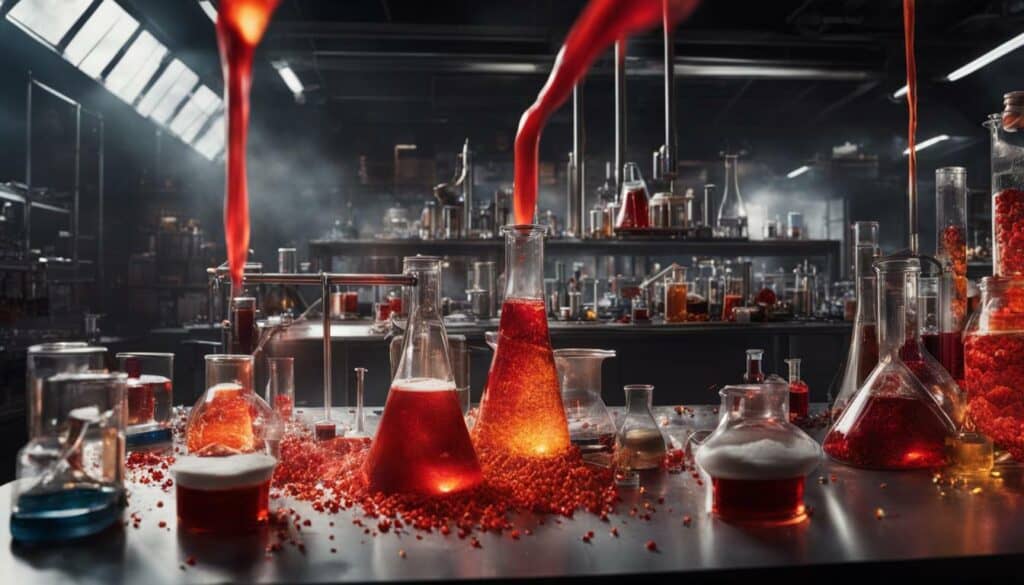
The Caffeine Content in Red Bull and Its Comparison to Other Beverages
Caffeine is one of the primary components of Red Bull, providing the wake-up call that many individuals rely on to kickstart their day. With 80 mg of caffeine per 8.4 fl oz can, Red Bull contains a similar amount of caffeine as a cup of coffee or a serving of cola. It’s no wonder that this energy drink has gained popularity among those seeking an extra boost of energy.
But how does Red Bull’s caffeine content compare to other common beverages? Let’s take a look at the numbers:
| Beverage | Caffeine Content (per 8.4 fl oz) |
|---|---|
| Red Bull | 80 mg |
| Coffee | 95 mg |
| Cola | 29 mg |
As you can see, Red Bull falls within a comparable range of caffeine content when compared to coffee and cola. This means that if you’re someone who enjoys a cup of coffee in the morning or occasionally indulges in a cola, Red Bull can offer a similar caffeine boost to help keep you alert and focused.
It’s important to note that individual caffeine sensitivity may vary, and moderation is key when consuming any caffeinated beverages. Listening to your body’s cues and consuming caffeine in moderation can help you enjoy the benefits of Red Bull without overdoing it.
- Red Bull contains 80 mg of caffeine per 8.4 fl oz can, providing a similar pick-me-up as a cup of coffee or a serving of cola.
- Compared to other common beverages, Red Bull’s caffeine content is within a comparable range.
- Individual caffeine sensitivity may vary, so it’s important to consume caffeine in moderation.
The Role of B-Group Vitamins in Red Bull: Niacin, Pantothenic Acid, Vitamin B6, and Vitamin B12
Red Bull is not just about the caffeine; it also contains a blend of B-group vitamins that contribute to its overall nutritional profile. These water-soluble vitamins are essential for various bodily functions and play a vital role in converting food into energy. Let’s take a closer look at the B-group vitamins found in Red Bull:
| Vitamin | Function | Food Sources |
|---|---|---|
| Niacin (Vitamin B3) | Helps convert food into energy and supports healthy skin and nerves | Chicken, turkey, fish, peanuts, and mushrooms |
| Pantothenic Acid (Vitamin B5) | Aids in energy metabolism and promotes healthy skin, hair, and eyes | Meat, beans, whole grains, and avocados |
| Vitamin B6 | Supports brain development, helps produce neurotransmitters, and aids in red blood cell formation | Poultry, fish, potatoes, bananas, and spinach |
| Vitamin B12 | Essential for red blood cell production, neurological function, and DNA synthesis | Shellfish, meat, dairy products, and fortified cereals |
These B-group vitamins are naturally present in various foods and are important for maintaining good health. While Red Bull can provide a small amount of these vitamins, it should not be relied upon as the sole source of these nutrients.
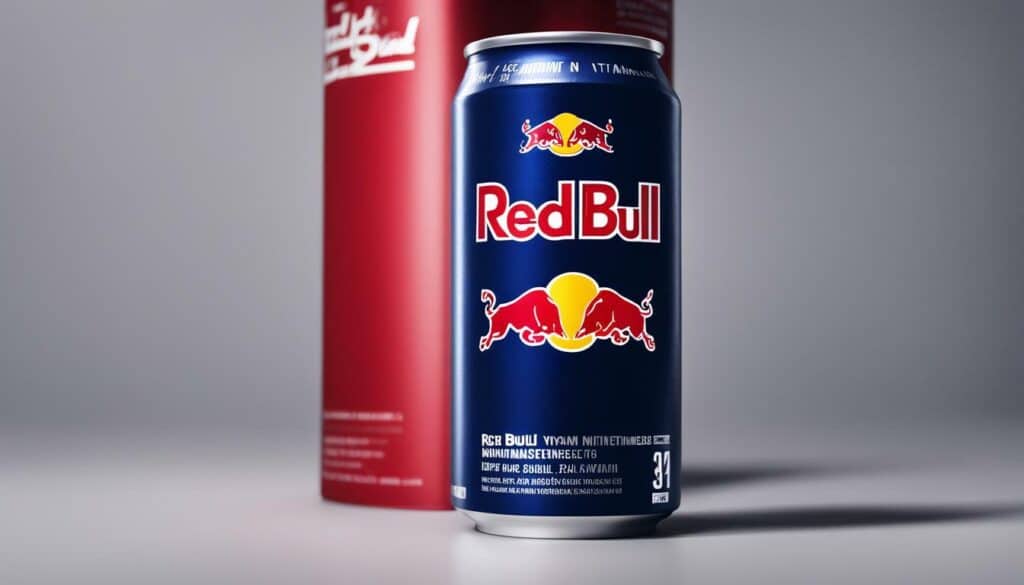
“B-group vitamins are essential for converting food into energy and maintaining overall health.”
It’s worth noting that the B-group vitamins in Red Bull are water-soluble, which means they are not stored in large amounts in the body. Therefore, it’s important to consume a balanced diet rich in natural food sources to meet your daily vitamin needs. Red Bull can be enjoyed as part of a well-rounded diet, but it should not replace a healthy and varied intake of nutrient-rich foods.
Understanding the Sugar Content in Red Bull and Its Comparisons
It’s no secret that Red Bull contains sugar, but how does its sugar content measure up to other common drinks? Let’s take a closer look at the sugar content in Red Bull and compare it to another sugary beverage like apple juice.
In an 8.4 fl oz can of Red Bull, you’ll find a total of 27 grams of sugars. This amount is comparable to the sugar content in a typical serving of apple juice. While it’s important to be mindful of your sugar intake, it’s worth noting that the sugar in Red Bull is derived from real sugar, rather than artificial sweeteners.
When considering the sugar content in different beverages, it’s essential to look at the overall context of your diet and individual health needs. While Red Bull may contain sugars, it can still be enjoyed as part of a balanced lifestyle.
| Drink | Sugar Content per Serving |
|---|---|
| Red Bull (8.4 fl oz can) | 27g |
| Apple Juice (8 fl oz serving) | 24g |
For those who are concerned about their sugar intake, it’s important to be aware of the amount of sugar you consume from all sources, including beverages. By making informed choices and practicing moderation, you can still enjoy Red Bull as a part of your overall diet.
In conclusion, while Red Bull does contain sugar, it is similar in sugar content to other commonly consumed beverages like apple juice. Remember to be mindful of your overall sugar intake and make informed choices about what you consume as part of a balanced lifestyle.
References:
- Red Bull Nutrition Facts. Retrieved from https://www.redbull.com/us-en/energydrink/red-bull-energy-drink
- USDA FoodData Central. Retrieved from https://fdc.nal.usda.gov/
Taurine is an intriguing ingredient found in Red Bull, but what exactly is it, and how does it contribute to the overall composition of the energy drink? Taurine is an amino acid that plays a vital role in various physiological processes in the body. It is naturally produced by the body and can also be obtained through certain food sources like scallops, fish, poultry, and infant formulas. In Red Bull, taurine is added to enhance the effects of the drink.
One of the main functions of taurine is its involvement in regulating hydration and electrolyte balance. It helps maintain the proper functioning of cells by ensuring the stability of cell membranes. Taurine also has antioxidant properties, which means it helps protect cells from damage caused by harmful free radicals. Additionally, it is believed to have a role in supporting cardiovascular health and promoting exercise performance.
It’s important to note that the amount of taurine found in a can of Red Bull is within safe limits for consumption. Red Bull, like any other beverage, should be consumed in moderation as part of a balanced and healthy lifestyle. As always, it’s a good idea to consult with a healthcare professional if you have any concerns or specific dietary needs.
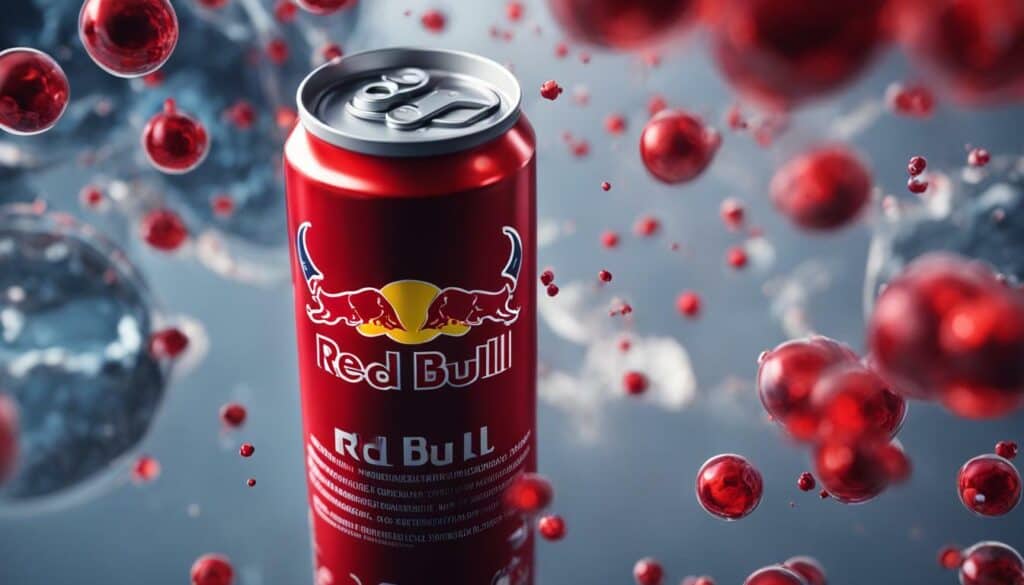
| Ingredients | Amount per 8.4 fl oz can |
|---|---|
| Caffeine | 80 mg |
| B-group vitamins (Niacin, Pantothenic Acid, Vitamin B6, Vitamin B12) | Various amounts |
| Sugar | 27 g |
| Taurine | Various amounts |
| Water | Main ingredient |
The Importance of Water in Red Bull’s Formula
Water may seem like a basic component, but it plays a crucial role in the composition of Red Bull. As one of the main ingredients, water ensures that the energy drink is not only refreshing but also hydrating. The high standards maintained for its water source guarantee the quality and purity of the beverage.
In fact, water makes up a significant portion of each can of Red Bull, contributing to its overall volume and ensuring a smooth and enjoyable drinking experience. The careful selection of water sources reflects Red Bull’s commitment to delivering a premium product to its consumers. It adds to the overall balance of the beverage, complementing the other ingredients and enhancing the flavor profile.
Furthermore, the inclusion of water in Red Bull helps to dilute the other components, such as caffeine and sugars, allowing for a controlled and balanced energy boost. This ensures that the drink is not overly intense but provides a gradual and sustained release of energy, leaving consumers feeling refreshed and revitalized.
| Benefits of Water in Red Bull |
|---|
| Hydrating and refreshing |
| Contributes to the overall volume and balance |
| Helps dilute other components for a controlled energy boost |
| Ensures high standards of quality and purity |
So, the next time you reach for a can of Red Bull, remember the important role that water plays in its formula. It’s not just about the bold flavor and energizing ingredients; it’s also about the refreshing hydration that accompanies each sip. Trust in the high-quality ingredients, including water, that make Red Bull the popular choice for those seeking an invigorating and satisfying energy drink.
There is a lot of misinformation circulating regarding the potential negative impacts of drinking Red Bull, but what does science actually say? Let’s take a closer look at the facts to separate myth from reality.
Myth: Red Bull is harmful due to its high caffeine content.
Fact: While Red Bull does contain caffeine, with 80 mg per 8.4 fl oz can, the amount is comparable to other common beverages like coffee and cola. Moderate consumption of caffeine can provide a temporary energy boost and improved focus.
Myth: Red Bull is loaded with unhealthy sugars.
Fact: Red Bull does contain sugar, with 27 g of sugars in an 8.4 fl oz can. However, this is similar to the sugar content found in apple juice. It’s important to remember that Red Bull is intended as an occasional energy drink and should be enjoyed as part of a balanced diet.
Myth: Taurine in Red Bull is dangerous for health.
Fact: Taurine is an amino acid that is naturally present in various foods, including scallops, fish, poultry, and even infant formulas. The amount of taurine in Red Bull is carefully regulated and within safe limits. There is no evidence to suggest that taurine in Red Bull is harmful when consumed in moderation.
| Myth | Fact |
|---|---|
| Red Bull is harmful due to its high caffeine content. | The caffeine content in Red Bull is similar to other common beverages and can provide a temporary energy boost. |
| Red Bull is loaded with unhealthy sugars. | The sugar content in Red Bull is comparable to that of apple juice and should be consumed in moderation. |
| Taurine in Red Bull is dangerous for health. | Taurine is a naturally occurring amino acid found in various food sources and is safe when consumed in moderation. |
It’s important to make informed decisions about our beverage choices. While Red Bull can be enjoyed as an occasional energy drink, it should not be relied upon as a substitute for a healthy lifestyle. As with any food or drink, moderation is key. If you have any concerns about the effects of Red Bull on your health, it is always best to consult with a healthcare professional.
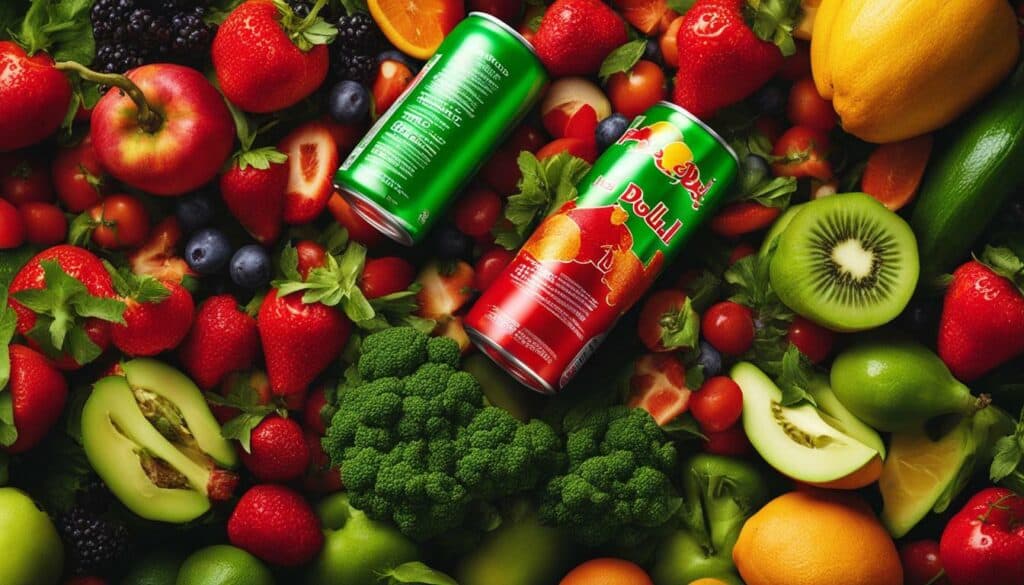
While Red Bull can be enjoyed as part of a well-rounded diet, it’s important to consider certain factors to make the most out of this energy drink. Red Bull Energy Drink contains high-quality ingredients that play a role in boosting energy levels, such as caffeine, B-group vitamins, sugars, taurine, and water. Being aware of these components and understanding their effects can help you make informed choices when incorporating Red Bull into your daily routine.
When it comes to caffeine content, Red Bull provides 80 mg per 8.4 fl oz can, which is comparable to the caffeine levels found in other popular beverages like coffee and cola. For individuals who are sensitive to caffeine or looking to limit their intake, it’s important to consume Red Bull in moderation and be mindful of your overall caffeine consumption throughout the day.
Red Bull also contains B-group vitamins, including niacin, pantothenic acid, vitamin B6, and vitamin B12. These water-soluble vitamins have essential roles in energy metabolism and can support overall well-being. However, it’s important to note that Red Bull should not be relied upon as a sole source of vitamins and minerals. A balanced diet that includes a variety of nutrient-rich foods is key to meeting your nutritional needs.
When considering the sugar content in Red Bull, it’s important to note that an 8.4 fl oz can contains 27 g of sugars, which is comparable to the sugar content found in other beverages like apple juice. If you’re watching your sugar intake, it’s essential to be mindful of the overall amount of added sugars in your diet and to moderate your consumption of sugary beverages.
Lastly, it’s worth mentioning that taurine, an amino acid found in Red Bull, is also present in a variety of other foods such as scallops, fish, poultry, and infant formulas. While the specific effects of taurine in Red Bull are still being studied, incorporating a balanced diet that includes a variety of protein-rich foods can help ensure you’re getting a diverse range of amino acids.
To make the most out of Red Bull as part of your diet, consider it as an occasional treat or as a pick-me-up during times when you need an extra boost of energy. Remember to balance your consumption with a nutrient-rich diet, stay hydrated, and listen to your body’s needs.
Summary:
- Incorporate Red Bull into your diet as part of a well-rounded approach.
- Be aware of the caffeine content and consume in moderation.
- Red Bull provides B-group vitamins, but a balanced diet is still crucial for meeting nutritional needs.
- Monitor your sugar intake and consider Red Bull’s sugar content in the context of your overall diet.
- Taurine in Red Bull is also found in other foods, so incorporating a variety of protein-rich sources is important.
Staying Mindful of Red Bull’s Calories: A Look at the Nutritional Profile
For those watching their calorie intake, it’s essential to be aware of the amount of calories packed into each can of Red Bull. This popular energy drink provides a quick pick-me-up, but it’s important to understand the nutritional content it contains. Let’s take a closer look at the nutritional profile of Red Bull and how it fits into a balanced diet.
In an 8.4 fl oz can of Red Bull, you’ll find approximately 110 calories. This makes it a relatively low-calorie beverage compared to other sugary options. However, it’s still important to consume Red Bull in moderation and be mindful of its calorie content, especially if you’re trying to manage your overall calorie intake for weight management purposes.
In addition to calories, Red Bull also contains high-quality ingredients that contribute to its nutritional profile. This includes caffeine, B-group vitamins, sugars, taurine, and water. These ingredients provide the energy boost associated with Red Bull, but it’s important to remember that they should be consumed as part of a balanced diet.
| Nutrient | Amount per 8.4 fl oz can |
|---|---|
| Calories | 110 |
| Caffeine | 80 mg |
| Sugars | 27 g |
It’s important to note that Red Bull should not be relied upon as a sole source of nutrition. Instead, it can be enjoyed as an occasional treat or as part of a well-rounded diet that includes a variety of healthy foods and beverages. By being mindful of the calorie content and nutritional profile of Red Bull, you can make informed choices about when and how to incorporate it into your diet.
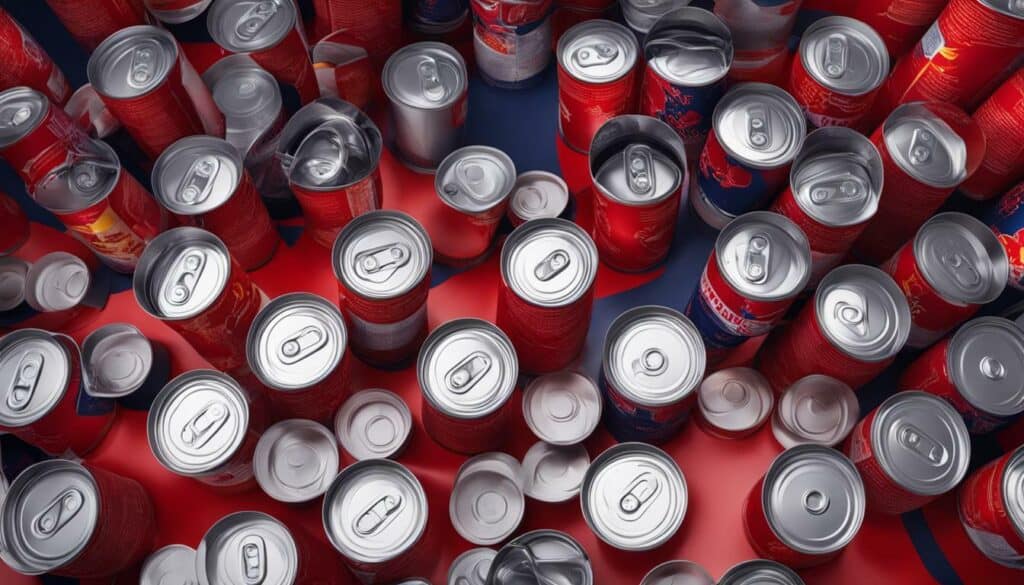
Conclusion
Red Bull is more than just a caffeinated beverage, and being aware of its nutritional information empowers consumers to make informed choices about their energy drink of choice.
When it comes to Red Bull’s nutritional profile, it contains high-quality ingredients that contribute to its unique formula. Caffeine, with 80 mg per 8.4 fl oz can, provides a similar boost as other popular beverages like coffee and cola. The presence of B-group vitamins, such as niacin, pantothenic acid, vitamin B6, and vitamin B12, adds a water-soluble vitamin complex to the mix.
For those concerned about sugar intake, Red Bull contains 27 g of sugars in an 8.4 fl oz can, comparable to the sugar content found in apple juice. Taurine, an amino acid present in Red Bull, is derived from natural sources like scallops, fish, poultry, and even infant formulas. Furthermore, water plays a vital role in Red Bull’s formula, with the brand maintaining high standards for its sourcing and quality.
Understanding the nutritional information of Red Bull allows consumers to incorporate it into a balanced diet and make conscious choices about their intake. By taking into account factors like caffeine content, sugar levels, and the presence of essential vitamins and taurine, individuals can enjoy Red Bull as part of their energy-boosting routine while taking care of their overall well-being.
FAQ
Q: What are the ingredients in Red Bull?
A: Red Bull contains high-quality ingredients, including caffeine, B-group vitamins, sugars, taurine, and water.
Q: How much caffeine is in Red Bull?
A: The caffeine in Red Bull is 80 mg per 8.4 fl oz can, which is similar to other beverages like coffee and cola.
Q: What vitamins are in Red Bull?
A: Red Bull contains water-soluble B-group vitamins such as niacin, pantothenic acid, vitamin B6, and vitamin B12.
Q: How much sugar does Red Bull have?
A: Red Bull is made with real sugar, with 27 g of sugars in an 8.4 fl oz can, comparable to the sugar content of apple juice.
Q: What is taurine and why is it in Red Bull?
A: Taurine, an amino acid, is present in Red Bull and is also found in foods like scallops, fish, poultry, and infant formulas.
Q: What is the role of water in Red Bull?
A: Water is a main ingredient in Red Bull, and high standards of quality are maintained for its water source.
Are Tender Greens Meals Nutritious as Well?
Are Tender Greens meals nutritious as well? Let’s find out by looking into the tender greens nutrition facts. With a focus on fresh ingredients and seasonal produce, Tender Greens offers a variety of meals that are not only delicious but also packed with essential nutrients. From their hearty salads to flavorful proteins, they strive to provide balanced options that support a healthy lifestyle.

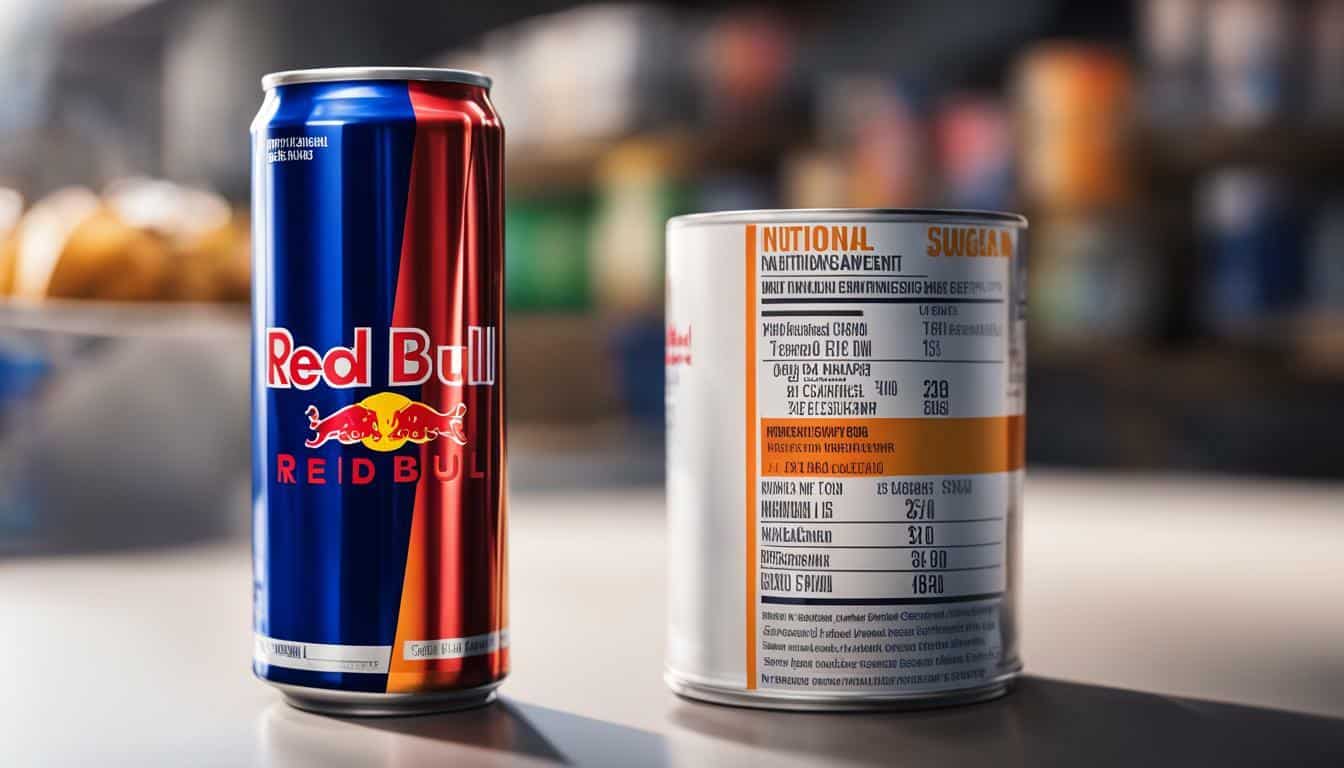



Leave a Reply